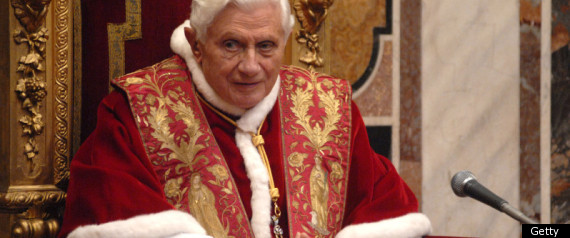VATICAN CITY, Jan 9 (Reuters) - Pope Benedict said on Monday that gay marriage was one of several threats to the traditional family that undermined "the future of humanity itself".
The pope made some of his strongest comments against gay marriage in a new year address to the diplomatic corps accredited to the Vatican in which he touched on some economic and social issues facing the world today.
He told diplomats from nearly 180 countries that the education of children needed proper "settings" and that "pride of place goes to the family, based on the marriage of a man and a woman."
"This is not a simple social convention, but rather the fundamental cell of every society. Consequently, policies which undermine the family threaten human dignity and the future of humanity itself," he said.
The Vatican and Catholic officials around the world have protested against moves to legalise gay marriage in Europe and other developed parts of the world.
One leading opponent of gay marriage in the United States is New York Archbishop Timothy Dolan, whom the pope will elevate to cardinal next month.
Dolan fought against gay marriage before it became legal in New York state last June, and in September he sent a letter to President Barack Obama criticising his administration's decision not to support a federal ban on gay marriage.
In that letter Dolan, who holds the powerful post of president of the U.S. Bishops Conference, said such a policy could "precipitate a national conflict between church and state of enormous proportions."
The Roman Catholic Church, which has some 1.3 billion members worldwide, teaches that while homosexual tendencies are not sinful, homosexual acts are, and that children should grow up in a traditional family with a mother and a father.
"The family unit is fundamental for the educational process and for the development both of individuals and states; hence there is a need for policies which promote the family and aid social cohesion and dialogue," Benedict told the diplomats.
Gay marriage is legal in a number of European countries, including Spain and the Netherlands.
Some Churches that have allowed gay marriage, women priests, gay clergy and gay bishops have been losing members to Catholicism, and the Vatican has taken steps to facilitate their conversion.
In 2009, Benedict decreed that Anglicans who leave their Church, many because they feel it has become too liberal, can find a home in Catholicism in a parallel hierarchy that allows them to keep some of their traditions.
The Vatican has since set up "ordinariates," structures similar to dioceses, in Britain and the United States to oversee ex-Anglicans who have converted and be a point of contact for those wishing to do so. (Reporting By Philip Pullella; editing by Tim Pearce)
Original Article
Source: Huff
The pope made some of his strongest comments against gay marriage in a new year address to the diplomatic corps accredited to the Vatican in which he touched on some economic and social issues facing the world today.
He told diplomats from nearly 180 countries that the education of children needed proper "settings" and that "pride of place goes to the family, based on the marriage of a man and a woman."
"This is not a simple social convention, but rather the fundamental cell of every society. Consequently, policies which undermine the family threaten human dignity and the future of humanity itself," he said.
The Vatican and Catholic officials around the world have protested against moves to legalise gay marriage in Europe and other developed parts of the world.
One leading opponent of gay marriage in the United States is New York Archbishop Timothy Dolan, whom the pope will elevate to cardinal next month.
Dolan fought against gay marriage before it became legal in New York state last June, and in September he sent a letter to President Barack Obama criticising his administration's decision not to support a federal ban on gay marriage.
In that letter Dolan, who holds the powerful post of president of the U.S. Bishops Conference, said such a policy could "precipitate a national conflict between church and state of enormous proportions."
The Roman Catholic Church, which has some 1.3 billion members worldwide, teaches that while homosexual tendencies are not sinful, homosexual acts are, and that children should grow up in a traditional family with a mother and a father.
"The family unit is fundamental for the educational process and for the development both of individuals and states; hence there is a need for policies which promote the family and aid social cohesion and dialogue," Benedict told the diplomats.
Gay marriage is legal in a number of European countries, including Spain and the Netherlands.
Some Churches that have allowed gay marriage, women priests, gay clergy and gay bishops have been losing members to Catholicism, and the Vatican has taken steps to facilitate their conversion.
In 2009, Benedict decreed that Anglicans who leave their Church, many because they feel it has become too liberal, can find a home in Catholicism in a parallel hierarchy that allows them to keep some of their traditions.
The Vatican has since set up "ordinariates," structures similar to dioceses, in Britain and the United States to oversee ex-Anglicans who have converted and be a point of contact for those wishing to do so. (Reporting By Philip Pullella; editing by Tim Pearce)
Original Article
Source: Huff

No comments:
Post a Comment